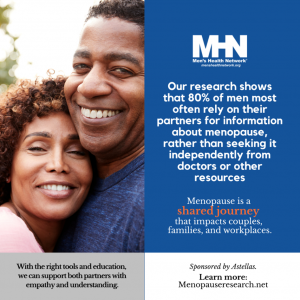Research Reveals Challenge: 93% of Men Report Relationship Change When Partner Experiences Menopause, Yet Navigate Alone
New research project also shows workplace silence and relationship strain may affect couples experiencing menopause.
WASHINGTON, DC, UNITED STATES, November 21, 2025 /EINPresswire.com/ -- Men's Health Network (MHN) today released findings from research revealing that menopause creates a largely hidden relationship challenge with 93 percent (14/15) of men reporting significant changes in their sexual relationships and two-thirds experiencing emotional distance from their partners.The research, sponsored by Astellas, which interviewed 15 men whose partners are experiencing menopause, revealed that while 100 percent (15/15) of participants identified patience as the most critical skill needed to support their partners, 73 percent (11/15) experienced significant emotional strain themselves. The study reports that men adapted to this strain using strategies like taking on household responsibilities and applying anger management techniques.
"The Roommate Effect" - When Marriages Transform
About 40 percent of men described their relationship as shifting toward feeling "like roommates" rather than romantic partners. "We don't talk about normal things anymore, how we used to," shared one participant, reflecting a communication breakdown experienced by 86 percent (13/15) of couples.
Despite these challenges, the research revealed remarkable resilience: over half of men (8/15, 53 percent) reported personal growth, learning emotional management skills.
Workplace Silence Creates Information Desert
The research exposed a critical gap in workplace support systems. While 60 percent (9/15) of men were aware of female colleagues experiencing menopausal symptoms, 80 percent (12/15) reported limited workplace discussions about menopause - with conversations remaining superficial
"I've heard hot flash jokes but almost never a serious conversation about menopause in a workplace setting," one participant noted, highlighting the need for better institutional support.
Men Prefer Information From Partners
The research revealed that 80 percent (12/15) of men prefer to receive information about menopause from their partners as their primary information source, rather than seeking medical resources independently. This pattern means men may struggle to provide informed support during the most challenging phases of their partner's transition.
"I learned about menopause from my wife, not from books or doctors," shared one participant. "For many men, menopause is something they see but don't fully recognize."
Treatment Knowledge Gap
While 87 percent (13/15) of men demonstrated awareness of basic symptom management techniques, only 33 percent (5/15) were aware of non-hormonal prescription medications. While 73 percent (11/15) of men had heard of hormone replacement therapy, their actual understanding of these treatment options was limited or superficial.
The Retirement Advantage
One unexpected finding revealed that couples where one or both partners were retired reported better outcomes. "Since I'm still working and she's retired, she has time to rest during the day. Our social life in the evenings is actually better than some of our friends," noted one participant, suggesting that reduced work demands could improve menopause experiences.
Call for Systemic Change
"This research reveals that we're treating a universal life transition as if it only affects women, when clearly it impacts relationships and families" said Ronald Henry, President of Men's Health Network. "We need targeted education for men, workplace policies that acknowledge this reality, and healthcare approaches that include partners in the conversation from the beginning."
The research calls for immediate action in three critical areas: workplace menopause education programs, male-focused educational resources, and healthcare provider training to include partners in menopause discussions.
About the Research
The research involved in-depth interviews with 15 men whose partners are experiencing perimenopause or menopause, examining relationship dynamics, workplace impacts, coping strategies, and information needs.
For complete research findings and resources, visit Menopauseresearch.net
Jennifer Thompson
Men's Health Network
+1 571-577-7675
email us here
Visit us on social media:
LinkedIn
Instagram
Facebook
YouTube
X
Other
Legal Disclaimer:
EIN Presswire provides this news content "as is" without warranty of any kind. We do not accept any responsibility or liability for the accuracy, content, images, videos, licenses, completeness, legality, or reliability of the information contained in this article. If you have any complaints or copyright issues related to this article, kindly contact the author above.

